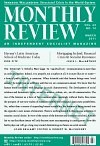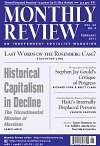Political Economy
For decades, major global and regional powers have waged war against those they accuse of fighting immorally—that is, those who use terrorism to harm civilians at home and abroad. Paradoxically, these righteous “wars on terror” are being fought in an era in which the distinction between war waged only against soldiers, and war against soldiers as well as civilians has virtually collapsed. The technological development, stemming from the Industrial Revolution, of aerial bombardment and weapons of mass destruction has made it more difficult to separate citizen from soldier.… [but] it is imperative that this distinction hold. In waging wars on terror, [upholding the soldier/citizen distinction] permits globally powerful nations to rally public opinion under the assertion that what separates us (self) from them (other) is that civilian life is paramount for us and not for “the terrorists.” | more…
Julius Rosenberg’s Decidedly Political Decision
I would like to expand on a couple of areas from Staughton Lynd’s thought-provoking essay (“Is There Anything More to Say About the Rosenberg Case?” MR, March 2011) on the case of my parents, Ethel and Julius Rosenberg. Though Staughton is too modest to “have a go” at the validity of the analysis presented in Walter Schneir’s Final Verdict, I think it is important to note that unlike the authors of Venona, whose work is quoted in the article, Schneir is the first writer to take the most recently released materials from the former Soviet Union and subject them to a close analysis in comparison to what we had always “believed” we knew about the case. | more…
Michael Lim Mah Hui and Lim Chin, Nowhere to Hide: The Great Financial Crisis and Challenges for Asia (Singapore: Institute of Southeast Asian Studies, 2010), 200 pages, $39.90, paperback.
Nowhere to Hide by Michael Lim Mah Hui and Lim Chin is another book on the financial crisis, although with added attention to Asia. In addition to the regional implications of the crisis for Asia, what makes this volume different from so many others is its critical perspective.… The book thus reflects an insider’s view of the banking system that is informed by a critical, political-economic perspective. As such, Nowhere to Hide makes a good companion to Monthly Review’s own The Great Financial Crisis by John Bellamy Foster and Fred Magdoff. Indeed, there is a close connection between these works, symbolized by the incorporation of Foster and Magdoff’s title into the subtitle of Nowhere to Hide. | more…

In the United States, it is now three years since the “Great Recession” began, and twenty-one months since it officially ended. Whether or not the end of the Great Recession means that the economy is now on the way to sustained recovery is another matter. Wall Street has rebounded dramatically, as have corporate—and especially financial sector—profits, but for ordinary men and women, circumstances are nearly as troubling today as they were at the bottom of the downturn in June 2009. | more…
The United States and the world are now a good two decades into the Internet revolution, or what was once called the information age. The past generation has seen a blizzard of mind-boggling developments in communication, ranging from the World Wide Web and broadband, to ubiquitous cell phones that are quickly becoming high-powered wireless computers in their own right.… The full impact of the Internet revolution will only become apparent in the future, as more technological change is on the horizon that can barely be imagined and hardly anticipated. But enough time has transpired, and institutions and practices have been developed, that an assessment of the digital era is possible, as well as a sense of its likely trajectory into the future. | more…
Where Do We Go from Here?
I have written repeatedly on the structural crisis in the world-system, most recently in New Left Review in 2010. So, I shall just summarize my position, without arguing it in detail. I shall state my position as a set of premises. Not everyone agrees with these premises, which are my picture of where we are at the present time. On the basis of this picture, I propose to speak to the question, where do we go from here? | more…
From Financial Crisis to Socialist Resistance
A specter is haunting Ireland—the specter of James Connolly.… Connolly was shot to death by a British firing squad for his role in Ireland’s 1916 rising for home rule. Celebrated as a hero of Irish independence by Irish political parties of both left and right, his socialism is all too conveniently overlooked. The Irish struggle is one that speaks to the challenges of independence, sovereignty, and democratic freedom, both then and now, for people of all countries. What value is formal political independence if it is not backed up by economic control; if the real decisions of public policy are made in boardrooms and backrooms rather than main streets and parliaments? | more…

The two lead articles in this issue of Monthly Review are both outgrowths of important new books published by Monthly Review Press. Samir Amin’s article, “The Trajectory of Historical Capitalism and Marxism’s Tricontinental Vocation,” is based on recent developments in his theoretical outlook presented in The Law of Worldwide Value…. A substantially revised and extended version of his earlier work, The Law of Value and Historical Materialism (Monthly Review Press, 1978), The Law of Worldwide Value also incorporates new conceptual breakthroughs, making it a major advance in itself.… The article by Richard York and Brett Clark entitled “Stephen Jay Gould’s Critique of Progress” is taken from their book The Science and Humanism of Stephen Jay Gould…. Gould’s far-ranging work in natural history, biology, and paleontology—even extending to the humanities and the social sciences—has fascinated countless readers, but the complexity of his thought and the extent of his intellectual commitments have defied previous attempts to bring out the unity of his work. | more…
[A]lmost four decades after the Club of Rome raised the issue of “the limits to growth,” the economic growth idol of modern society is once again facing a formidable challenge. What is known as “degrowth economics,” associated with the work of Serge Latouche in particular, emerged as a major European intellectual movement in 2008 with the historic conference in Paris on “Economic De-Growth for Ecological Sustainability and Social Equity,” and has since inspired a revival of radical Green thought, as epitomized by the 2010 “Degrowth Declaration” in Barcelona.… Ironically, the meteoric rise of degrowth (décroissance in French) as a concept has coincided over the last three years with the reappearance of economic crisis and stagnation on a scale not seen since the 1930s. The degrowth concept therefore forces us to confront the questions: Is degrowth feasible in a capitalist grow-or-die society—and if not, what does this say about the transition to a new society? | more…
Looking for the Movement as a Whole
In 1913 Lenin identified three intellectual sources of Marxism: German philosophy, English political economy, and French utopian socialism—each in turn created in the social conditions of their societies. But the process did not end there. Marxism continues to grow and to learn from the most advanced, liberating ideas of each period. (It is also influenced in negative ways, narrowing its horizons and getting dragged along by fashion in times of defeat). Here, I want to identify four contemporary sources of enrichment of Marxism: ecology, feminism, national/racial struggles, and pacifism. It is important to recognize them as sources of ideas, not only as allies in political struggles. Their interaction with Marxism is, of course, different from the pre-Marxist sources. They come to Marxism from the outside, but from an outside already influenced in part by Marxism, and they are both welcomed and resisted. | more…

This 51st annual Socialist Register completes the investigation of class formation and class strategies on a global scale begun with last year’s volume. Deploying an understanding of class as an historical social process—rather than an abstract sociological category or statistical artifact—the essays here investigate the concrete ways that working classes are being made and remade in the struggles against neoliberalism, austerity, and authoritarian governments. Taking stock of the changing balance of class forces as well as old and new forms of workplace, household and political organization, they uncover the class strategies being debated and adapted in different zones of the world. | more…
Existing international economic institutions and relations operate in ways detrimental to third world development. That is why eight Latin American and Caribbean countries—led by Venezuela, Cuba, and Bolivia—are working to build the Bolivarian Alliance for the Americas (ALBA), a regional initiative designed to promote new, nonmarket-shaped structures and patterns of economic cooperation.… In response to worsening international economic conditions, ALBA has recently stepped up efforts to promote a full-blown regional development process.… Although the precise terms of the agreement are still to be negotiated, official statements point to the creation of an integrated trade and monetary zone, with a new regionally created currency, the sucre. | more…


